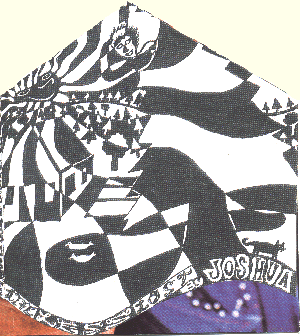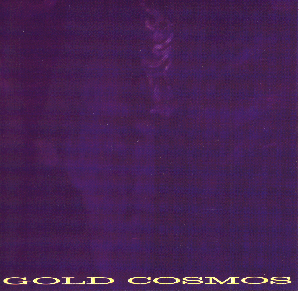Music Writing by Carson Arnold



MIDNIGHT ANGEL (An Interview
With Joshua)
Joshua's music is like the burning tail of a shooting star falling into the limbs of a forest seance. Since 1995, his three homemade records have been wheeling in the weightless caravan in search of the holy ghost of British-folk's haunted pew. Beached with all the undertow of the Incredible String Band, Robbie Basho and Shirley Collins, Joshua is more like a humming dulcimer stranded out in the fog in the outskirts of town and country, night and day. Like the inside of a daylily at eve his latest, Gold Cosmos, blooms the willow of an enchanting sound-frost and thaws the eternal bud of folk's most starch, gloomy and tender cry. One might never think Joshua is alive or awake in his recordings, but more in a melodious coma, a transient fairy-tale dreaming silent. Guitar-tala-chill at its most barren wonderland, this midnight angel casts the demons and tokens aside, catches the wind and flowers the ferns away.
(This interview was recorded by the art of email between April 1st and April 13, 2003)
Carson: Your debut, Owl Leaves Rustling, is one mad-hatter of an album. How did a record like this evolve? There seemed to be a lot of things evolving behind it.
Joshua: it IS a pretty bizarre record... it came about as a direct result of a couple different factors/events. first of all, at the time, i was still doing music with the Twisted Village folks but really wanted to branch off and do my own thing as i was getting into more acoustic stuff. so, while it IS based in the crazy improv movement they were part of, maybe there are some indications of where i was headed? the other factor/event was me graduating from art school (i was doing a lot of painted on collage-type stuff) and realizing that music was more where my heart was (and i wanted to keep on creating...). if i could scrape together enough money to put out a record by myself with money i made from scrounging around in the trash, or working a couple days in a record store, it would be a beautiful world. also previously i played in a lot of different bands and played on the street quite a bit which might or might not have contributed to the album.
C: Oh yeah? What kind of music would you play on the street? Boston, right?
J: mostly i'd just play solo improvised sax, though sometimes i'd have a drummer play with me. yeah, it was in Boston down by the waterfront. there was a spot with really intense acoustics where i recorded myself a few times. i used a few minutes of those recordings on that first album...
C: How do you meet up with Twisted Village?
J: they lived in Connecticut the same time i did and were djs at the same college radio station that i was a dj at in high school. i went to see their band Crystalized Movements a few times and really liked them (and even ended up playing in the band a few times!) they moved to boston a few years later and we all rented a house together and made a lot of music. they have a record store in boston and have put out 50+ records over the years.
C: Speaking of records, there must be something you're working on now.
J: i'm in the beginning stages of a new direction which i can't really talk about yet. i'm always working on stuff, the process of creating is something i really enjoy.
C: I smell a rock album! {pause} Gold Cosmos took a large chunk of time to record and finish. It seemed like it had a real solid vision.
J: with gold cosmos, more than the other two albums, i was really trying spend as much time as possible to make it come out right. i knew i liked recording at home and wanted to finally make an album i was really proud of. lifelesslost took a little more than a week to record and gold cosmos took 3 years. it was part of me for most of my days for those years, as i would always be thinking of different ways of doing things and who i could have help me with songs. i had it professionally mastered and mixed it at the sonic youth studio in new york. i just wanted to make a really strong statement that would last after i was gone.
C: People playing on the album, did you write their parts or was it pretty much all casual and open?
J: sometimes i knew exactly what i wanted, and sometimes people would come up with their own parts. sometimes we would just be having fun and end up with something great.
C: You write, play and produce all your songs -home-recorded- and on top of all that, do the art work and run a record shop.... I somewhat imagine your lifestyle has contributed to your music.
J: sure, it's all interwoven. i don't think that was a planned out thing or anything, it's just where my path has taken me. i like working in a record store in a small western mass. town. don't really know how my lifestyle has directly contributed to my music, but i can't really picture any of the elements of my life not being there...
C: Then of course there's you doing the art-work for each individual record.
J: i love making the covers. i'd like it to be like you are discovering this artifact when you find one of my records somewhere...
C: Right. Yeah, it's definitely great...er...Of course there's a lot of influences...
J: there are a lot of influences... but if i had to put them in a pot to boil, the biggest influences on my newer albums would be british folkies like incredible string band, vashti bunyon, and nick drake in one bubble and pet sounds era Brian Wilson in another bubble. i think everyone has a few albums that really connect with their inner spirit and these are the ones for me. i turn to them in my darkest moments. Otherwise most of my other influences lay in the 60's folk/psychedelic realm.
C: No other music has inspired you?
J: oh, i was talking mostly about my influences on the gold cosmos record. over the years i've listened and been inspired by so many kinds of music. i still listen to all kinds of stuff and most recently i've been listening to a lot of old-timey and international records. i grew up as a punk rocker and was in punk bands and a heavy metal band and even a top 40 cover band for awhile. when i started making records it was really hard for me to focus because i like so many kinds of music, but you can't do everything. so i've tried to focus on making music similar to stuff that really moved me the most, which tends to be 60's folk type stuff.
C: What do you think about Punk music now?
J: i don't listen to it too much these days. i'm sure there's still some decent stuff coming out, but i'm listening to other things right now. of course when i hear some of the classic punk albums that i grew up with there's no denying the power behind them. all music has it's own place and audience...right?
C: I believe so...You could always return as a street musician, then the world's your audience.
J: i've thought about it, but at this point it wouldn't really work out with the kind of stuff i'm doing. the years i did it were great, and i totally respect people out there doing it...
C: The kind of stuff you're doing. Okay, so in concert how do you perform, what do you do, especially when your records are so studio-made?
J: the main thing is that i need a p.a. for my vocals. but that's not the main reason i don't want to play this stuff on the street, i just don't think it's the right way to present this stuff...
C: Hey, there's no verse/chorus/verse/chorus any of your stuff.
J: that's true. i'm trying to explore the idea of what is a song and other ways of combining vocals/words and music.
C: According to Mojo, you and a few others of the Tower Recordings lot are of a new generation and breed of folk musicians. Like to me, folk has always been about expression, movement, community, you know, all passions in between. I must wonder what the general expression and belief is of this present folk music that you and company are pioneering right now.
J: i can't really talk for anyone else in this "movement", but for me folk music means music made by folks for other like-minded folks without some of the other commercialized bullshit that is involved in a lot of other music. i would like to think that, at it's best, some of this current "folk"(i wouldn't call it folk or volk) music could help a listener transcend a lot of the bullshit that we all have to deal with in life these days. I think some of it taps into folk music of the sixties just as some sixties folk music tapped into music of the years before it. As far as what it expresses, i guess that depends on who the listener is i guess.
C: Your albums tend to remind me of a darker side of Donovan's For Little One's, except I usually can't understand a word you're saying. How come? Your lyrics must come from somewhere.
J: thanks, i like a lot of donovan's albums. he's a real positive force in the universe...i'm always writing stuff down, and have piles of lyric ideas around to draw from. other times the music itself tells me what to say.
C: Absolutely. The dialogue with the children's toy in "Guidance From Vernon, Fl" {Life Less Lost} is pretty interesting.
J: i took that sample from this documentary by Errol Morris called "Vernon, Florida". in it they interview all these local characters and old-timers. i really recommend the film.
C: Yeah. So it sounded like you had fun recording Life Less Lost. The songs kind of move though you almost like a breeze.
J: the album was composed and put together in a multi-faceted way. all the songs came to me differently, some more spontaneously and some i had written before or developed from tapes of parts i had worked out before. some came to me in dreams...
C: And then you'd wake up and record all night...
J: ...or wake up and write things down. or they come to me in daydreams. or they come to me in dreams that i'll remember from the past... and my equipment will be set up and ready.
...For information on Joshua and his recordings, please write to:
feather one's nest c/o M.T 12 no. pleasant Amherst, MA 01002
